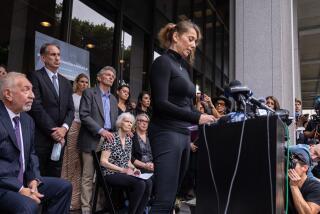Children Testify Against Barrera
As jurors consider whether Marco Barrera should be executed for the slayings of his two young children, four of his other offspring testified Monday about their deep loathing for the man who raised them.
Three of the Barrera children told a San Fernando jury that they hope never to see their father again. A 20-year-old son and a 14-year-old daughter, asked if they had come to court to save their father’s life, answered simply: “No.”
“I just hate him,” the girl told the jury at Los Angeles Superior Court in San Fernando.
Barrera, 38, of Pacoima, was convicted last week of two counts of first-degree murder in the beating deaths of 2-year-old Guadalupe “Lupita” Esquivel and 5-year-old Ernesto Esquivel. Their bodies were found buried in Angeles National Forest in 1998.
The jury will begin deliberations later this week on whether Barrera should be sentenced to death or life in prison without parole. Superior Court Judge Ronald S. Coen will pronounce final sentence against the one-time street vendor.
In all, four of Barrera’s 12 surviving children testified against him Monday. The emotional courtroom statements came on the same day that Barrera’s parents joined the defense’s plea for mercy.
Sandi Gibbons, spokeswoman for the Los Angeles County district attorney’s office, acknowledged how unusual the day’s testimony was--with a defendant’s children aiding prosecutors in their quest to execute a parent. The action drew criticism from at least one group opposed to the death penalty.
Bonnie Bucqueroux, founder of the Michigan-based Crime Victims for a Just Society, characterized the decision to ask Barrera’s children whether he should die as one of the “nightmare consequences” of capital punishment.
“I’m just shocked the prosecutor would put them in that position,” Bucqueroux said Monday. “What if these kids change their minds in the interim and decide that their father shouldn’t have been put to death? You’ve left them in an untenable position.”
Gibbons defended her office’s action: “These children were brutalized by their father. They testified that they saw their brother and sister murdered. Who better to testify at the penalty phase of the trial?”
Speaking in a persistent monotone, Barrera’s 20-year-old son provided the strongest statements against his father, testifying that he had confronted Barrera after Lupita’s death and called him a murderer. “I was angry. He had no explanation why my sister had died,” he said.
The son said he ran away from his mother’s house but returned after learning about Ernesto’s death from a televised report. When he heard where the boy’s body was discovered, he said he feared it was little Ernesto.
A few months earlier he had been to the same area of Angeles National Forest with his father to bury Lupita, he said.
He said it hurts when he thinks about his younger siblings. “I would change everything that I have for their lives,” he said, speaking in Spanish.
He and his 14-year-old stepsister said they would never tell their children about Barrera. “I never had a father,” he said.
A 10-year-old son told the jury he still has nightmares that Barrera is “trying to kill me.” When asked if he cares what happens to his father, the boy answered quietly, “No.”
When the youngest witness got on the stand, the 8-year-old boy spoke haltingly and answered repeatedly: “I don’t know.”
He told Deputy Dist. Atty. Carolyn McNary he had written a letter a few days earlier while thinking about his father and about his upcoming court appearance. In the single-page note on lined paper, the boy scrawled dozens of times in pencil: “He can hurt me.” In the center, the boy added the words “hate you” and circled them.
But Barrera received support from other family members, in particular his parents, who also addressed the jury.
His mother, father, aunt and uncle came to Los Angeles from Mexico, with help from the Mexican government. They offered jurors a glimpse into Barrera’s poor upbringing on a farm.
Showing his first sign of emotion as his mother talked about their life, Barrera wiped his eye with his shirt collar. In his opening statement of the penalty phase, public defender Arthur Braudrick told jurors he would not try to explain or justify Barrera’s crimes. He said family members from Mexico were there “to save his life.”
Times staff writer Richard Fausset contributed to this story.
More to Read
Sign up for Essential California
The most important California stories and recommendations in your inbox every morning.
You may occasionally receive promotional content from the Los Angeles Times.









